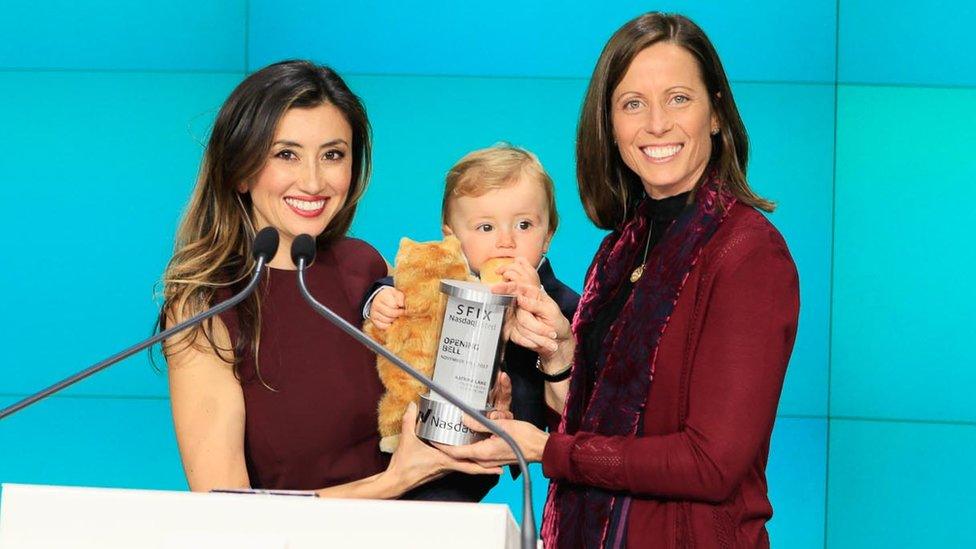The Boss: Male investors didn't get my billion-dollar idea
- Published

Katrina Lake and her son, with Adena Friedman, the chief executive of the Nasdaq
The BBC's weekly The Boss series profiles different business leaders from around the world. This week we speak to Katrina Lake, founder of online fashion business Stitch Fix.
For the first six years running Stitch Fix, Katrina Lake wasn't comfortable with being labelled a female business leader.
"I didn't join the women in business clubs, and I just never thought of myself as a quote-unquote feminist," she says.
But taking her company public back in November 2017 led to a change of heart. The tech entrepreneur had her then 14-month-old son in her arms when she appeared at the Nasdaq stock exchange in New York for the firm's first day of trading.
The images went viral. Katrina, 34 at the time, become the youngest ever female founder to lead an initial public offering (IPO). She was widely hailed a role model for women, and mothers, in business.
"It felt like a really meaningful moment for me, and hopefully for others as well," she says. "Showing examples of successful female CEOs is so important. So, I came around to being at a place where I really embraced it."
Stitch Fix is an online personal shopping service that uses a combination of artificial intelligence (AI) algorithms and human stylists to send customers fashion items that should be to their taste.

Users are sent clothes and accessories from a variety of brands selected especially for them based on their size, preferences and budget. They then keep and pay for what they want, and return what they don't.
Katrina founded the company in 2011, aged 28, while studying for a Master of Business Administration degree at Harvard Business School, in Boston. Today her business is worth $1.4bn (£1.1bn), has 3.4 million customers, 6,600 employees, and annual sales of $1.6bn., external
But the path to this remarkable success wasn't smooth. Katrina's business was turned down by numerous potential investors, and she struggled to raise funds in the early days.
She also says that she wasn't taken seriously, simple because she was a woman. Meanwhile, a number of press reports in 2017 said that she had faced sexual harassment.
"There was so much adversity that I faced just because I was a woman," she says. "What I realised through starting the company was that I'd thought of feminism as being a political thing, and this wasn't a political thing. This was about human rights and equality."

Retaining a 16.6% share in Stitch Fix, Katrina's net worth stands at more than $200m. However, she didn't initially set out to become an entrepreneur.
After growing up in Minnesota and San Francisco, she had wanted to follow in the footsteps of her father and become a doctor. Instead, after getting a degree in economics from Stanford University she started her working life as a management consultant, and later worked for an investment firm.
Her passion was clothing retail though, and she hoped that being at an investment company would enable her to meet e-commerce founders, so that she could become part of the next big thing in the consumer fashion industry.
"I just wanted to work at whatever was going to be the future of apparel retail," she says. But she soon gained the confidence to go it alone. "I realised there's nothing special about being an entrepreneur," she says.
Katrina had the idea that people wanted a more personalized approach when it came to shopping for clothes, and that AI could help. At 5ft 2in (1.6m) tall, she says that she had always struggled to find clothes to suit her petite stature.
Her sister, a fashion buyer, was also an inspiration. "She was like a personal stylist to me sometimes... she knew all the up and coming brands," says Katrina.
To pursue her idea for Stitch Fix she enrolled at Harvard. While there she started to build the business from her student digs, along with her co-founder Erin Flynn. Flynn, a former buyer for US retailer J Crew, subsequently left the business in 2014.
"We cobbled together things you could do online for free," says Katrina. She would conduct online surveys to find out what potential customers wanted to buy.

Initially targeting women, she would get prospective customers to enter information such as their size and the brands they liked. Then she'd buy clothes at boutiques with her credit card, and, with the help of friends and family, send them out.
"I would buy it at retail [prices] and sell it at [the same] retail [prices], so I wasn't making any money," says Katrina. "But at least I could experiment to see if the concept worked."
The business quickly took off. "It was 30 [employees], then 50 and then 120, and then it just grew organically from there." They managed to raise some capital, made some key tech hires to beef up the AI, and opened their headquarters in San Francisco.
In the early days, the business struggled to keep up with the pace of growth. "We had a waiting list for a while," says Katrina.
A big challenge was raising funds from the male-dominated investment community. "I didn't have the trust of a lot of investors, and for me the biggest reason was around the lack of diversity in the venture capital world," she says.

More The Boss, external features:

"[Male] investors would say things like 'I can't see myself wanting something like this', and I'd be, 'Okay, well you're a Caucasian male who is very wealthy, and maybe this isn't the service that you would use.'"
The business eventually attracted backers and Stitch Fix raised $42.5m, followed by a further $120m in the IPO. And it expanded to also sell men's and children's clothing.
Tamara Sender, senior fashion analyst at market research group Mintel, says Stitch Fix's success has been spurred by time-pressed consumers looking for a more bespoke approach.
"Stitch Fix's proposition responds to rising demand for a more personalised clothes shopping service, with growing interest among consumers in receiving lifestyle-based fashion recommendations," she says. "It also draws on people's need for convenience."
Katrina, whose mother was a Japanese immigrant, says she is focused on promoting diversity within her company, both women and people from ethnic minorities.
"I was brought up in a bilingual, bicultural household," says the 37-year-old, who lives in San Francisco with her husband, and two children.
"To be able to have broader representation in your team really just adds to the perspectives, ideas and global thinking you can have."